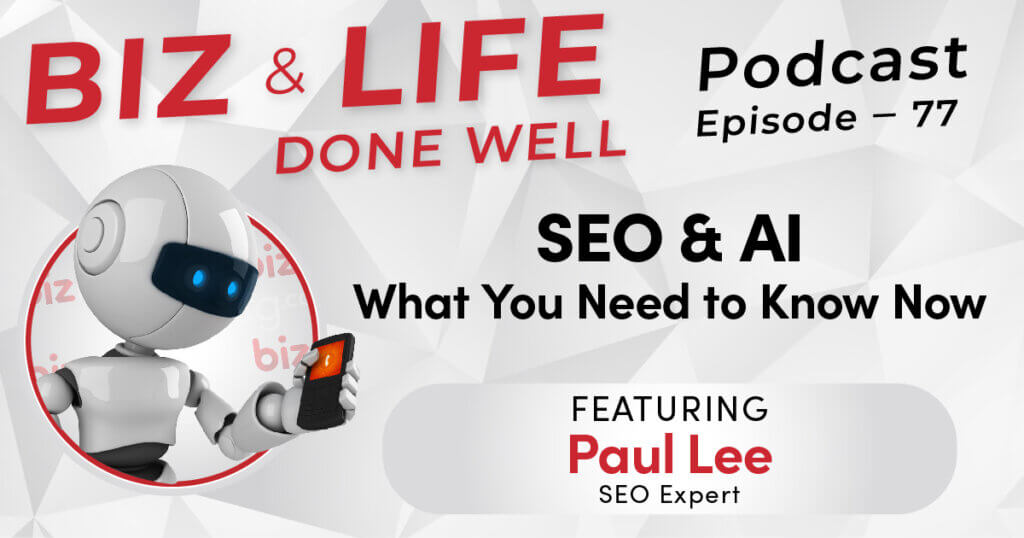Title: SEO & AI – What You Need To Know Now
Guest: Paul Lee
Peter: Today, my guest is our SEO expert, our favorite SEO expert, Paul Lee. I really enjoyed the discussion about Bigfoot we had before we turned on the mics and started rolling Yeah. Today. Can’t wait to dig into that. So just for the record, Paul is not a believer in Bigfoot.
Paul: And Peter, what would you your status on this on this? He’s a believer. He’s a believer.
Peter: I’m a believer.
Paul: Social distancing champion. Yes. Hide and seek champion of the world.
Peter: Bigfoot. Bigfoot. Hi goodness. AKA Yeti. But we’ll save that conversation for a different day.
Today, we’re gonna talk about AI artificial intelligence and SEO. Where? Next? What is happening between AI? Obviously, we’re all hearing about AI.
Right?
Paul: Yeah. Yeah. Yeah. And kinda came out of nowhere. Know, people have always I mean, they’ve always talked about AI since, you know, fifty years probably.
It’s been a it’s a concept that people have been thinking about, and they’ve they’ve been developing things towards it. But most of the efforts were pretty lame, pathetic, you know, whatever, until this year, last in the last year, and OpenAI came out with ChatGPT and kinda set the world on on fire with this thing like, let’s say, is getting kinda close. This actually is usable and interesting and helpful and, you know, so maybe AI is the way that we know where it’s going. And of course, that shook up the world. Meta, Facebook, you know, tried to put out a chat bot, which they’ve obviously been developing but isn’t ready for prime time yet.
And Microsoft has one, Bing Chat, Bot which is also somewhat unhinged. And so Google’s put out Bard even. AI is really like taking over in the sense of it’s taking over at least a mind share. People are talking about it a lot and one of the first things I saw when ChatGPT came out is somebody tweeted SEO is dead.
Peter: Interesting. So so let’s back up just one second here. So when we talk about ChatGPT, I did a whole video recording of this. I have an article that I wrote and it was a video recording of this. But just to be clear about what chat GPT for and AI and what we’re discussing today is called generative AI.
We’re we’re giving the AI, the computer, the software a prompt, and then it’s spitting back a response based on the question that we asked. Generally, that’s the form that you would ask. It’s a question you’d ask, and then it will come back with an answer. So that that’s sort of the premise of what we’re talking about today with respect to AI.
Paul: Yes, yes, absolutely. So the quality of what AI generates is very much dependent on that prompt. It’s interesting, people have some people, the first thing they do when they see something like chat GPT or something is they try to break it. They they they try to trick it or, you know, give it something that it won’t won’t understand or try to skirt its rules. Other people look to it for to to explore and plummets biases and political leanings because of, you know, how it’s been trained or who programmed it or whatever, you know, and I I’ll leave that to other people.
I think, those are interesting questions, I suppose. I mean, I’ll I’ll write up there with, like, should we even be doing this at all, or is that gonna cause the extinction of humankind?
Peter: Paul, I haven’t had enough coffee. No. We’re we’re yeah we’re gonna stick to search engine optimization in Exactly.
Paul: So so
Peter: And how they do they work? Are they compatible? Are you out of business? Because AI is gonna take over your job.
Paul: Yeah. So that’s the that was the instead of looking to figure out how to break it or to look to figure out why it says what it says, my first thought was how can we use this? I mean, that’s that’s the first thought and I think that’s for a lot of business people that’s the first thought they’re gonna have is how can we use this, and is it any good? So I’ve looked at it, I’ve played around with it, I’ve used it for some projects. And I was initially somewhat skeptical in the in the terms of I thought Google was going to probably penalize people for using it.
But Google recently has come out and said that there is no penalty for using AI generated text as long, this is the big caveat, as long as it’s helpful. And that’s the same for human generated content. As long as the content is helpful, Google doesn’t mind. Because if sort of wasting space and just words for the sake of words, if it’s incorrect information, those sorts of things, then yeah, it’s not gonna be helping your content. But Google says, long as it’s helpful, absolutely, fair game.
So that was like, okay, let’s test this thing out and see what it does. And my big question was, is it gonna put me out of business? I I I don’t think it will put me out of business. No. No.
I I think I think it’s useful. It’s massively useful. I think it’s it’s very intriguing and I think it will probably streamline some some parts of the job especially content creation, but it has to be babysat. Like, you have to watch it.
Peter: So your your conclusion so far is that it’s good at couple things. What are the specific things? So one is content. Content, but is it are you gonna actually let it write the whole content? Are you gonna use it for a part of the process or where are you seeing it most useful right now?
Paul: Right now, I’ve used it I have tried to have it write something completely. I find that it writes pretty generic kind of text and it’s not that great. So what I’ve found works much much better is to say ask it a question like, I need 10 topics about roofing that people search for and are asking for questions about. Need each of one of them I need 10 of them. I need each one to start with a gerund like finding a roofer, inspecting your roof, you know the -ings gerunds or -ings.
So give me 10 of those. Boom. It gives me 10 topics. Now I might say, okay I like topic number three. What are four subtopics underneath that in the form of questions that people might have?
So I use that to organize my own writing. Now that’s in the writing process. You can even start earlier than that. It does help. It’s super helpful in initial research, especially if you don’t know much about a topic.
So you know somebody needed an article very quickly. It’s not somebody we usually write articles for and so we were just like coming up to speed very fast. And so I just put in the four biggest questions about such and such. And boom. It gave me the four biggest questions and how might you answer, how might other people answer those questions.
Boom. I got the answers for those things. So now I still had to run it past the people we were writing for and make sure that this was right because I don’t know that area all that well. And one thing I have found is that AI, this goes into the category of what doesn’t do well, AI can be extremely confidently wrong. It could be like, this is exactly what it is and you say actually I know a 100% that that’s not it and it goes, oh I’m sorry, you’re right, it’s not.
But if you didn’t, you Well actually, wouldn’t
Peter: one of the features of at least AI, OpenAI’s ChatGPT, is that you rate the response. You can give it a thumbs up or a thumbs down.
Paul: Yes, yes.
Peter: And then it says, What did you like about it? What was wrong with it? What could be better? So it’s using that as part of its AI model to get better and better. So in theory, if people actually take the time to give a little bit of a true answer as to what was wrong with it, over time the AI gets smarter and smarter, which is one of the core features of these models.
Paul: Exactly, exactly. And ultimately it’s you know it’s trained on material it finds on the internet, which is not necessarily always a 100% accurate as you know. What? What? I think there may be occasional pages out there every once in a while where somebody publishes something which is total and absolute crap.
So it has been fed.
Peter: Speaking of
Paul: Bigfoot again. Yeah, after this you need to ask chat GPT what it thinks about if it believes in Bigfoot or not.
Peter: Is Bigfoot real?
Paul: Is Bigfoot real? I’m gonna be interested in that question. And then after that ask it the ultimate question of life, the universe and everything. Let’s see if the answer is 42. So, doesn’t AI can be very confidently wrong.
So, have to just you have to double check the work, You have to to babysit it a little bit. But it’s massively helpful in terms of generating lots of ideas, in terms of coming up with subtopics, in terms of coming up with here’s a description for a page I wrote. Give me five other variations of that description. And I pick one that I like better.
Peter: Well and that’s one thing that I’ve used it for. The primary use I’ve used it for with respect to the work we do in marketing is using it to write some headline copy. So I need ten thirty character headlines for, going back to your roofing example, for a residential roofing company for homeowners. So specifically stating Google Ads. So the more specific you can be about your prompt or your question, the better the answers are.
And I’ve used, you know, I asked for ten, three of them were good. The other, seven were just like blah. But the other thing I’ve done with it is use it to rewrite copy that I already wrote or that we already wrote. So we’ve actually gone on to our website, taken a block of text and say, summarize this. Or taking it and say, rewrite this, just rewrite this, and it’ll just rewrite.
Yeah.
Paul: And of course you still need to edit that or read it because it can make mistakes. And there other tools besides that, don’t want to boil AI down to just ChatGPT. There are things like QuillBot and Jasper and other things that are out there that all have different capabilities. Quillbot specializes in rewriting and doing exactly what you just said and can do things like I’ve written this 500 page article blog, can you rewrite it in a more expansive way or in a friendlier way or in a simpler way for us and easier readable. To
Peter: change the tone.
Paul: Change the tone and it’s quite good at that. So those are kinds of things but we’re not asking it to write from scratch that much. And even if you do ask it to write, like you said, the quality of the prompt matters a lot. So you say, don’t just say, write an article about roofing. You need to say, come up with some topics.
Here’s a topic. Write at least a thousand words. I want at least five points. Each point must be persuasive. Use as many transitional phrases as possible.
Avoid passive voice sentence construction, etcetera. So you’re giving it lots of of guardrails. Even then it often doesn’t stick to the word count, doesn’t do exactly what you say, but it tries. And so, you know, it’s a that’s a super helpful thing. There’s there’s nothing wrong with that.
I think I think what will end up happening is there will be sort of a hybrid solution between content writers and AI. So they will use it for idea generation for, I’ve written this headline, but I would like six other variations and I could pick what a slightly better one or maybe mine’s the best one. You know, and so they’re using it to to more quickly iterate through possible different ideas and things, but it’s never gonna replace a human reading it. And then not not that’s just that’s just for content. We’re we’re talking also SEO is far more than just content.
So pulling together all the threads of links and headlines and on page stuff that’s you know, behind the scenes stuff and page optimization things and speed optimization and all that stuff, that isn’t getting replaced by AI. So you know, content ideas, things that you give explicit instructions and say go do that, don’t be creative, not asking the AI to be creative. Like read an AI poem. AI generated poems are terrible. Like they can’t they just don’t think creatively like we do.
But if you ask it for very very specific things and then it will follow those instructions and it does it quite well.
Peter: Got it. So one of the things that I’ve found it most useful for is just generating prompts to get me started. So I’m or not generating prompts, but I I will feed it a prompt, just a a seed of an idea. Mhmm. And then it will like I’ll say, give me five thoughts on this topic.
Mhmm. And it’ll, and a lot of times what I was thinking but wasn’t able to actually put down on the page will pop up. I’m like yeah, that’s exactly what I was looking for so I’ll grab one of those. So I find it very helpful and just in terms of helping the creative process.
Paul: Yes, yeah. I think that’s a great way of sort of like bouncing ideas off a friend or sitting out and having a brainstorming session is what it feels like. Yeah. And because it’s got this massive library of information and it’s got basically an endless vocabulary, it can come up with all sorts of slightly different phrasing and things that make you go, Oh yes, I like that better. I’m gonna grab that.
I saw another cool thing that it does. I did not know this until I just today I actually learned this. You can ask it to output things in formats other than things like paragraph and all that stuff. So you can say things like, here’s a list of 10 things about roofing. Categorize them into things that you need to know before you do it and things you need to know after you buy it, whatever and output the results in a table.
It will make a table that shows which things are from before the sales process to after the sales process. So it will put out a table. You can say put out in the form of an outline. Can then this is the coolest one. Mean I’m not even sure when I’ll use this.
But you can I had a client that needed to exclude some files from Google through their robots.txt file, which is a file on the web server that that search engines look at to see where they’re allowed to go and where they’re not? And it’s got its own syntax and things that have to be there or whatever. So I saw somebody write the prompt to chat GPT. I want Google to not be able to access this page, this page, and this page and I want Yahoo not to be able to access anything. Please write my robots dot txt file and it outputted the robots dot txt file for them.
There it was.
Peter: So it’s writing code.
Paul: It’s writing code for you. So you tell it what you want and it generates the code that you need. That you need then So I could go to the developer or the guy that’s the you know the webmaster for that website and I could say here’s exactly what you need to put in your robots. Txt in order to block out these particular files rather than saying, hey man can you go look that up and here’s the things and he’s got to go find the syntax for it and whatever, instead I just send in the actual snippet of code.
Peter: So you saved an hour or two of work.
Paul: Yes, absolutely. And I because I don’t I don’t know. I don’t work with robots dot txt every day. I know what it is. I know how to, you know, what it’s supposed to do and and I can go figure out the syntax, but it’s not something I would do every day.
Peter: You know enough to get it done.
Paul: Exactly. And chat GPT can say chat GPT knows exactly the format that it needs to be in and spits out the code for me. Thank you very much.
Peter: So they’re they’re actually you’ve probably heard about this. They’re actually implementing OpenAI into GitHub for code generation. So you can actually use it explicitly for generating code.
Paul: I can see that because a lot of times you’d want to be able to you can explain what you want to do. If this exists, then do this, but if this other thing happens then I want to make sure it does you can explain it and then if something like that can then turn that into actual code to do that in this language. Oh actually I changed my mind, you put it out in Perl or can you put it out in Ruby on Rails or can you put it out in Javascript?
Peter: Which which are different
Paul: All different computer languages.
Peter: Computer languages.
Paul: And it’s just put it out the same logic but in those languages.
Peter: So so I’ve got a novel application of AI that I just ran into two days ago, Seth Godin. You know who Seth Godin is? Mhmm. Seth Godin is probably one of the preeminent authors, writers, marketing books. He’s written Permission Marketing was the first book he wrote that I got ahold of.
He’s prolific. He’s very thought provoking. Just a great Basically he’s like the guru of marketing, of modern marketing I should say. And he took 5,000,000 words of his own work and used that as a library that a chat is based on. You can ask it questions.
And I did that. So I said to Seth, basically it’s like talking to Seth. Based on 5,000,000 of the words he’s I mean, guy’s a prolific author. So let me look it up here and I’ll tell you what I asked it and what we came back with. Okay, so here it is.
Seth. So the first thing I said is what are three things good marketers should consider when planning an ad campaign? Very simple prompt. And it came back with, first of all, who are you trying to reach? If the answer is everyone, start over.
How will they become aware of what you have to offer? What story are you telling, living, spreading? By answering these three questions, a marketer can ensure that their campaign is targeted, effective, and resonates with the worldview of their target audience. Additionally, it’s important to consider the fear that may prevent action, the timing of the campaign, and the potential word-of-mouth impact. So that is exactly what I was looking for.
Paul: As
Peter: I go about my work, I copied and pasted it into a Word doc or a Google doc and I have it pinned to the top of my to the work that I do.
Paul: Now you combine that with the new deepfake kind of technology with videos and all that and you could have Seth Godin give you a one on one master class you know, based on
Peter: Yeah.
Paul: Yeah. Stuff is powerful. But you have to have that library of information like Seth Godin has produced, you know, in order to create that. But yeah, that’s an amazing ability to do that. So AI’s got some stuff.
It’s definitely there. And I can see what the hubbub is about. But ultimately you have to have a Seth Godin create that information so that the AI can do
Peter: it. Right. So in conclusion, I mean, it’s a tool, right, AI, ChatGPT, or not ChatGPT, I shouldn’t say that generative AI is a tool. And I think we’re just getting started.
Paul: Yeah, no. I think when you treat it like a tool and you learn how to use any tool, and the same thing with any any tool. You learn what works best, what to avoid, how to, I mean for lack of a better word, exploit it, and use it to its fullest potential. That’s great. So we’ll use it to streamline some processes.
Still takes a human, a human still needs to be involved. It may change some writers roles from writer to writer slash editor of AI generated copy.
Peter: Right.
Paul: But that’s really not much different than a lot of I’ve looked at, what did you do to write this article? I looked at five other articles that were out there to kind of get some ideas and I made my own thing. Well that’s kind of what this is. That’s what, you know, except as you’re looking at 5,000,000 other articles.
Peter: Yeah, was gonna say that’s this on steroids. Not on steroids. So Zapier, who makes a API connection tool that we use a lot to connect cloud software or software as a service entities to others. It’s Zapier. They came out with an article just recently.
Said, don’t make these mistakes with AI. And I it’s pretty much where we got to here. Don’t let it work unsupervised. Don’t over rely on it as a research tool. And the last one I thought was pretty funny.
Don’t pretend you’re not using it.
Paul: Yeah, exactly. I think we can all understand the advantages that it might provide but it’s still it’s gonna require humans so it’s not like, hey we’re taking your money because we’re just having a computer do it for us, you know. It’s not that at all. If it ever gets to that point, you know, I’ll eat my hat. I just don’t think it’s gonna happen.
Not that, not that like that. So yeah, we are using it but we’re not abusing it and using it in ways that aren’t helpful to our clients. It always goes back to what Google said. They don’t have any penalty for using AI as long as it’s helpful. As long as the content that we’re creating and all the stuff that we’re doing is helpful, then that’s then that’s where the proof’s in the pudding.



